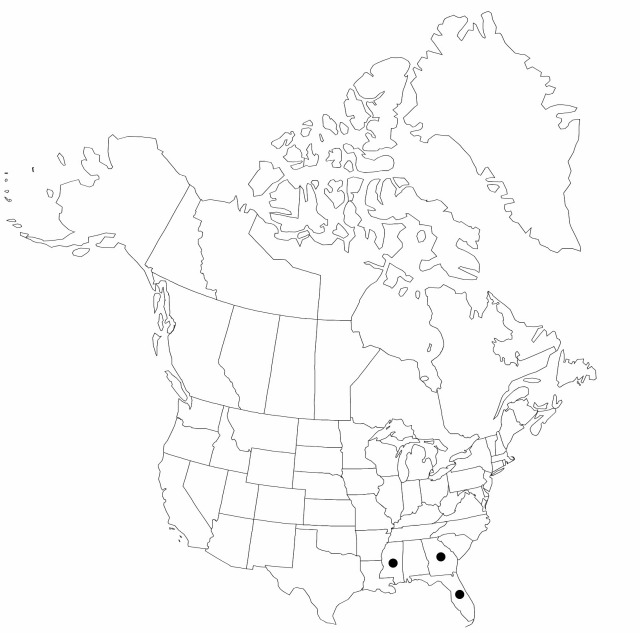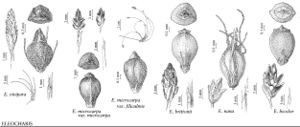Difference between revisions of "Eleocharis bicolor"
Fl. South. U.S., 517. 1860.
FNA>Volume Importer |
imported>Volume Importer |
||
| (6 intermediate revisions by 2 users not shown) | |||
| Line 6: | Line 6: | ||
|place=517. 1860 | |place=517. 1860 | ||
|year=1860 | |year=1860 | ||
| + | }} | ||
| + | |special_status={{Treatment/ID/Special_status | ||
| + | |code=F | ||
| + | |label=Illustrated | ||
| + | }}{{Treatment/ID/Special_status | ||
| + | |code=C | ||
| + | |label=Conservation concern | ||
}} | }} | ||
|basionyms= | |basionyms= | ||
| Line 24: | Line 31: | ||
|distribution=Fla.;Ga.;Miss.;West Indies;Central America (Nicaragua). | |distribution=Fla.;Ga.;Miss.;West Indies;Central America (Nicaragua). | ||
|discussion=<p>Of conservation concern.</p><!-- | |discussion=<p>Of conservation concern.</p><!-- | ||
| − | --><p>The culms of Eleocharis bicolor sometimes have complete transverse septa which are prominent when plants are aquatic.</p> | + | --><p>The culms of <i>Eleocharis bicolor</i> sometimes have complete transverse septa which are prominent when plants are aquatic.</p> |
|tables= | |tables= | ||
|references= | |references= | ||
| Line 33: | Line 40: | ||
-->{{#Taxon: | -->{{#Taxon: | ||
name=Eleocharis bicolor | name=Eleocharis bicolor | ||
| − | |||
|authority=Chapman | |authority=Chapman | ||
|rank=species | |rank=species | ||
| Line 47: | Line 53: | ||
|publication title=Fl. South. U.S., | |publication title=Fl. South. U.S., | ||
|publication year=1860 | |publication year=1860 | ||
| − | |special status= | + | |special status=Illustrated;Conservation concern |
| − | |source xml=https:// | + | |source xml=https://bitbucket.org/aafc-mbb/fna-data-curation/src/2e0870ddd59836b60bcf96646a41e87ea5a5943a/coarse_grained_fna_xml/V23/V23_139.xml |
|genus=Eleocharis | |genus=Eleocharis | ||
|subgenus=Eleocharis subg. Eleocharis | |subgenus=Eleocharis subg. Eleocharis | ||
Latest revision as of 20:38, 5 November 2020
Plants probably perennial, tufted, not stoloniferous; rhizomes present, ± horizontal, 0.2–0.4 mm thick, firm, longer internodes 3–7 mm, scales translucent or not. Culms often ascending, often spotted or streaked red-brown, cross section quadrangular or broadly elliptic, often sulcate, 1.5–8(–25) cm × 0.1–0.3 mm, soft. Leaves: distal leaf sheaths persistent or fugaceous, closely sheathing, not conspicuously wrinkled, colorless or pale brown, sometimes spotted red-brown, delicately membranous, apex narrowly acute. Spikelets: basal spikelets absent; never proliferous, ovoid or ellipsoid, laterally compressed or terete, 1.5–3.7 × 0.8–3 mm, apex acute; proximal scale empty, persistent, amplexicaulous, similar to floral scales; subproximal scale with a flower; floral scales distichous (spirodistichous), 8–22, 6–10 per mm of rachilla, colorless or pale brown, mottled red-brown to purple, ovate, (1–)2 × 1 mm, membranous, midribs green and red-brown, prominent, apex rounded to obtuse. Flowers: perianth bristles present or absent, (1–)4, colorless to white, vestigial to shorter than achene, 0–0.55 mm; spinules not evident at 45X; stamens (1–)3; anthers 0.35–0.45 mm; styles 2-fid (or 3-fid). Achenes whitish to pale brown, obovoid, biconvex, rarely trigonous, angles prominent, 0.5–0.8 × 0.4–0.6 mm, apex slightly constricted proximal to tubercle, smooth. Tubercles sessile, green or red-brown, pyramidal, birettaform or umbonate, 0.15–0.25 × 0.3–0.4 mm.
Phenology: Fruiting summer–late fall.
Habitat: Moist banks, freshwater, damp pine barrens
Elevation: 0–50 m
Distribution

Fla., Ga., Miss., West Indies, Central America (Nicaragua).
Discussion
Of conservation concern.
The culms of Eleocharis bicolor sometimes have complete transverse septa which are prominent when plants are aquatic.
Selected References
None.
